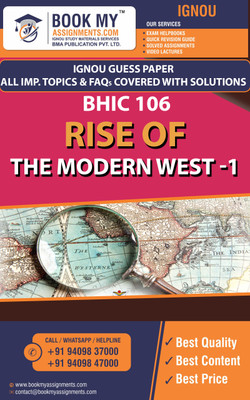IGNOU BHIC 106 Rise of the Modern West ŌĆō I | Guess Paper | Important Question Answer |BACHELOR'S (HONOURS) DEGREE PROGRAMMES(Paperback, BMA Publication)
Quick Overview
Product Price Comparison
Transition from Medieval to Early Modern Period: The course would likely focus on the transition from the medieval period to the early modern period in Western history, roughly spanning from the late Middle Ages to the early modern era (c. 1400ŌĆō1700).Renaissance and Humanism: Students would explore the Renaissance, a period of cultural and intellectual flourishing characterized by a revival of interest in classical learning, art, literature, and humanism. This could involve studying prominent figures such as Leonardo da Vinci, Michelangelo, and Machiavelli.Reformation and Religious Change: The course may cover the Protestant Reformation and its impact on European society, politics, and culture. This could involve examining the teachings of Martin Luther, John Calvin, and other reformers, as well as the religious conflicts and wars that ensued.Scientific Revolution: Students would likely study the Scientific Revolution, a period marked by significant advancements in science, mathematics, astronomy, and philosophy. This could involve exploring the work of figures such as Copernicus, Galileo, Kepler, and Newton, and the emergence of new scientific methodologies.Exploration and Expansion: The course may examine the Age of Exploration and European expansion overseas, including the voyages of Christopher Columbus, Vasco da Gama, and Ferdinand Magellan. This could involve studying the motives for exploration, the impact on indigenous peoples, and the establishment of colonial empires.Political and Social Changes: Students would likely explore political and social changes during the early modern period, including the rise of nation-states, absolutism, constitutionalism, and the emergence of new social and economic structures. This could involve studying the political theories of thinkers such as Niccol├▓ Machiavelli, Thomas Hobbes, and John Locke.Art, Architecture, and Literature: The course may cover developments in art, architecture, and literature during the early modern period, including the Baroque style, the plays of William Shakespeare, and the works of artists such as Rembrandt and Caravaggio.Global Connections and Cultural Exchange: Students would likely examine the increasing interconnectedness of the early modern world through trade, diplomacy, and cultural exchange. This could involve studying the impact of global trade networks, the spread of ideas and technologies, and encounters between different cultures.


